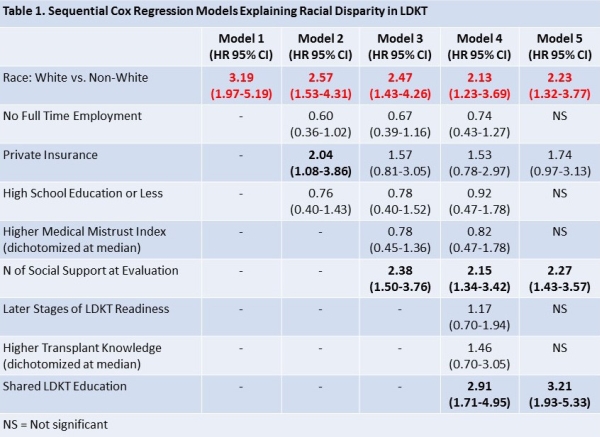Modifiable Causes of Racial Disparities in Living Donor Kidney Transplant
J. Beaumont,1 J. Peipert,1,2 C. Anderson,2 A. Paiva,3 M. Robbins,3 A. Waterman.1,2
1Terasaki Research Institute, Los Angeles, CA
2Division of Nephrology, David Geffen School of Medicine at UCLA, Los Angeles, CA
3Department of Psychology, University of Rhode Island, Kingston, RI.
Meeting: 2018 American Transplant Congress
Abstract number: 227
Keywords: Kidney transplantation, Psychosocial
Session Information
Session Name: Concurrent Session: Kidney Psychosocial - 2
Session Type: Concurrent Session
Date: Monday, June 4, 2018
Session Time: 2:30pm-4:00pm
 Presentation Time: 2:54pm-3:06pm
Presentation Time: 2:54pm-3:06pm
Location: Room 210
Racial disparities between White and non-White patients in receiving living donor kidney transplants (LDKT) are large and widespread. Yet, the causes of this disparity are not understood.
In this study, 714 patients presenting for transplant evaluation at UCLA between May 2014 and March 2017 were followed for a median of 24 months to determine if they had received a LDKT. We used a sequential series of Cox regression models, starting with the unadjusted impact of race (Model 1), to determine the extent to which socioeconomic status (SES) (Model 2), psychosocial variables (Model 3), and LDKT decision-making variables (Model 4) reduced the disparity. Finally, we fit a parsimonious model (Model 5) using backward selection to determine the best predictors of time to LDKT.
In total, 184 (26%) Black, 275 (39%) Hispanic, and 255 (36%) White patients participated. Since only 5 Black patients received LDKT, we dichotomized race as White vs. non-White. The unadjusted racial disparity in time to LDKT receipt was large (Table 1).
Each sequential model reduced the race HR. The % reduction in racial disparity in adding SES variables (Model 2) was the largest at 19%, though the effect of modifiable LDKT decision-making variables still reduced the racial disparity by 14% even after controlling for SES and psychosocial variables. The best predictors of time to LDKT were modifiable, including increasing attendance of others at evaluation and sharing LDKT education.
Although some of the racial disparity in LDKT is accounted for by non-modifiable factors like SES, interventions increasing non-white patients' support network involvement in learning and attending evaluation may reduce the racial disparity in LDKT by activating more living donors coming forward.
CITATION INFORMATION: Beaumont J., Peipert J., Anderson C., Paiva A., Robbins M., Waterman A. Modifiable Causes of Racial Disparities in Living Donor Kidney Transplant Am J Transplant. 2017;17 (suppl 3).
To cite this abstract in AMA style:
Beaumont J, Peipert J, Anderson C, Paiva A, Robbins M, Waterman A. Modifiable Causes of Racial Disparities in Living Donor Kidney Transplant [abstract]. https://atcmeetingabstracts.com/abstract/modifiable-causes-of-racial-disparities-in-living-donor-kidney-transplant/. Accessed February 20, 2026.« Back to 2018 American Transplant Congress

